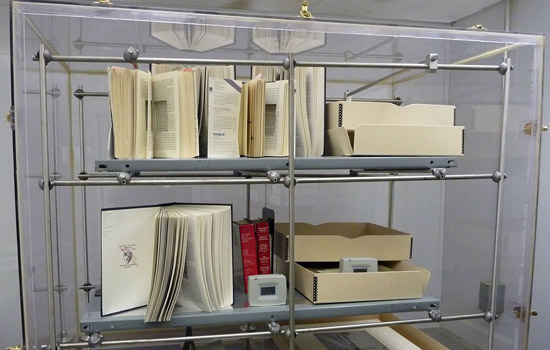Image Permanence Institute receives three grants
Research aimed at managing the environment in collecting institutions
Library materials shown inside a chamber prior to being exposed to a variety of damaging conditions. RIT’s Image Permanence Institute will simulate the effects of summer dampness and winter dryness on the materials in a new study.
The Image Permanence Institute (IPI) at Rochester Institute of Technology recently received three significant grants related to sustainable preservation practices for managing the storage environment in collecting institutions.
The Institute of Museum and Library Services National Leadership for Libraries program awarded $305,107 to IPI for “Demonstrating a Sustainable Energy-Saving Methodology for Library Environments.”
During this three-year project, IPI will work closely with three partner libraries to test and refine a methodology for achieving significant improvements in energy efficiency without placing collections at risk.
“The goal is to provide information that will allow institutions to achieve this goal using their own staff and existing resources,” said James Reilly, director of the Image Permanence Institute. “Information on sustainable mechanical system operation in libraries and a proven methodology for achieving an optimal preservation environment will be consolidated into an easy-to-use publication at the close of the project.”
The National Endowment for the Humanities Preservation and Access Research and Development program awarded IPI $350,000 for research titled “Understanding Moisture Equilibrium for Humanities Collections: A New Path to Sustainable Humidity Control.”
This three-year research project will include the study of moisture equilibration rates for paper-based library materials and test new ways of managing relative humidity that could reduce the risks to collections from the most damaging conditions of summer dampness and winter dryness.
“Strategies for managing the storage environment based on this research could significantly reduce energy costs while providing safe environments for books, manuscripts, maps, prints and other paper-based humanities materials,” Reilly said.
The National Endowment for the Humanities Preservation Education and Training Program awarded IPI $190,000 for “Sustainable Preservation Practices for Managing Storage Environments—Series #3,” which will fund the presentation of five free workshops and nine webinars on environmental management for museums and libraries across the United States.
“Our two previous Sustainable Preservation Practices series were extremely successful, reaching thousands of individuals in institutions around the world,” Reilly said. “IPI will provide information on recent preservation research along with the tools and strategies that will enable staff in collecting institutions to make informed, strategic decisions regarding sustainable practices that result in responsible collection care, energy cost savings, and carbon footprint reduction.
IPI has been active in the development of sustainable practices to improve the preservation quality of storage and display environments in cultural institutions since the late 1990s. The concept of an optimal preservation environment—one that achieves the best possible preservation of collections with the least possible consumption of energy—forms the foundation of IPI’s environmental management philosophy.
IPI has taken its experience with material preservation research and environmental assessment into the field to explore and develop a cross-disciplinary approach between building engineers, facility managers, collection staff and preservation specialists.
About the Image Permanence Institute
The Image Permanence Institute, part of RIT’s College of Imaging Arts and Sciences, is a recognized world leader in the development and deployment of sustainable practices for the preservation of images and cultural property. The institute accomplishes this through a balanced program of research, education, products and services that meet the needs of individuals, companies and institutions.













